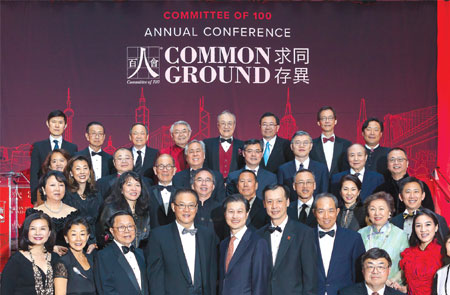C-100 strengthens US-China relations
Updated: 2014-04-25 11:44
By Qidong Zhang (China Daily USA)
|
||||||||
It was founded 24 years ago and the two countries it focuses on have changed, but the mission of the Committee of 100 has not: to serve as a bridge between the cultures and people of China and the United States, Qidong Zhang reports from San Francisco.
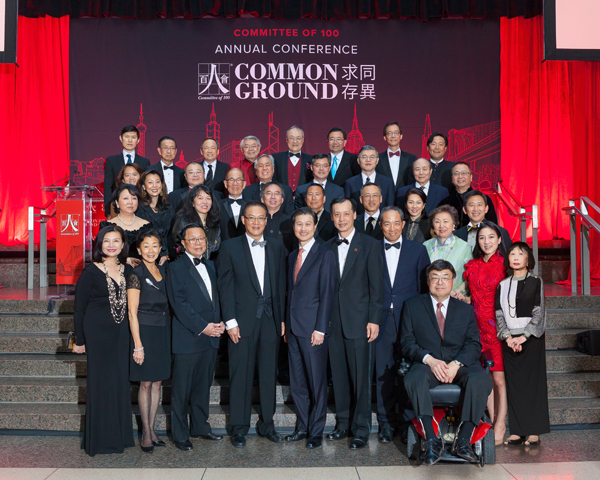 |
| C-100 members at C-100's 22nd Annual Conference in Washington, DC in 2013. |
The Committee of 100 (C-100) is an invitation-only membership organization with more than 150 Chinese Americans who are US citizens of Chinese heritage. They have achieved leadership positions in their fields of endeavor and have a passionate and active interest in C-100's mission.
The non-profit organization was established in 1990 by a group of prominent Chinese Americans aiming to serve as "cultural ambassadors" and to foster the exchange of ideas and perspectives among its membership with those in the community and government.
Its goal is to serve as a bridge between the cultures and people of China and the US, providing a forum for issues that Americans of Chinese descent face in reaching their full potential as US citizens.
For 24 years, C-100 has been dedicated to the dual mission of encouraging constructive relationships between the people of the US and Greater China, and promoting full participation of Chinese Americans in all aspects of American life.
Acting as advisers to CEOs, partners to policy makers, trusted sources for leaders in government, and ambassadors who bring people from the two countries together, C-100's guiding principle is "Seeking Common Ground While Respecting Differences."
George Koo, a member of C-100 since 1997 who has been speaking and writing on perspectives of US-China relations, racial profiling of Chinese in America and business strategies for Asia, says the organization has made tremendous efforts in "pooling its strengths and experiences to address important issues concerning the Chinese-American community, as well as issues affecting Sino-American relations."
"Committee of 100 was established in1989 by architect I.M. Pei and a handful of prominent Chinese Americans that he knew. He was appalled at the time by how little Western media knew and understood about China. He did not feel that he should be the only person to explain China, but that body of influential Chinese Americans together could provide a credible voice of reason to explain, and thus become a rational voice to promote positive bilateral relations between the US and China," he said.
'Respecting differences'
"A series of white papers were written by C-100 members on the theme of 'Seeking Common Ground, While Respecting Differences.' When then president Clinton prepared to visit China in 1998, we were invited to provide a briefing at the White House. Subsequently, when Clinton visited China, he spoke on that theme," said Koo, who was a co-author of the papers.
Koo said that close to 100 members under the leadership of Shirley Young, the founding chair (1990-1995) and Henry Tang(1996-2002) concentrated on interfacing with the US Congress and Senate to promote an active voice of Chinese Americans with policy makers.
Young served as corporate vice-president of General Motors (GM) in China and co-led its entry into China with the Shanghai-GM joint venture building Buicks.
Tang is a 30-year investment-banking veteran of Wall Street. He was a managing partner of Jefferies & Co and later founded Carnegie Tower Strategic Investment Advisory.
"The group of us knew our way around in Washington and interacted with Congressmen, Senators, members of congressional foreign affairs committees, members of the National Security Council and initiated dialogues to seek mutual understanding," said Koo.
"At that time the bilateral relationship was very much influenced by bias and anti-China emotions, even things like economic cooperation could be turned into China-bashing emotions. We did our best to neutralize extreme views, especially views that were not based on facts. We tried to shed light to the truth," he explained.
Koo said the following decade of C-100 (2000-2010) was a very active bridge-building period between US and Chinese policy makers because of efforts made by committee members.
During this time, the chairmen of C-100 were Robert Lee (2003-2005), chairman of the board, Blue Shield of California, who also served as president of Pacific Bell (now a part of AT&T); John Fugh (2006-2008), the first Chinese-American general in the US Army and judge advocate general of the US Army; and John Chen (2009-2010), former CEO of Sybase, now Blackberry.
Under their leadership, groups of C-100 members visited Chinese top-level officials, with meetings held in Zhongnanhai compound with China's then premier Zhu Rongji, Hong Kong chief executive Tung Chee-hwa, and Taiwan leader Ma Ying-jeou. Having met each of them several times himself, Koo said it was vitally important that C-100 members understood what each side was thinking.
"We wanted to hear what their thoughts on the cross-the-border relations and understand each side. I felt it was important that we were there, listened to what each side had to say and pass along their thoughts across, when political environment was tough and a normal direct dialogue was difficult, if not impossible," he said.
To promote its mission, C-100 is aligned with three core programs: education, diplomacy and leadership development.
An Ping, public relations director of C-100, said an annual educational exchange involves inviting four to five US leaders from business, civic community and media to visit China. Most participants are first-time visitors to China. Through the committee's vast networks, delegates receive a first-hand experience of China and the opportunity to meet visionaries who are shaping the country.
Some of the past delegates include Jill Abramson, then managing editor of the New York Times; Rekha Basu, columnist of the Des Moines Register; David Brooks, columnist of the New York Times; Rana Faroohar, assistant managing editor of Time Magazine; Nicholas Goldberg, editor of the editorial pages of the Los Angeles Times and David Ignatius, columnist of the Washington Post.
"Most of the visitors told us that they became more interested in China with an understanding of the complex nature of Chinese politics, history and culture after their visit," An said. "And we want to make sure our program advances C-100's continuing effort to dispel erroneous assumptions and misperceptions about China and work against narrow-minded simplistic conclusions."
Winnie O'Kelley, a 2012 delegate then at the New York Times, said, "I am now much more aware of the Chinese belief in gray areas, instead of absolutes, and the emphasis on pragmatism. I think that I will do a much better job of editing stories from across Asia."
Annual scholarships
In collaboration with leading universities in China, C-100 has been honoring one to two outstanding graduates of each school with annual scholarships for their leadership and public-service achievements. Each nominee writes an essay on China-US bilateral relations and their views of public service. A panel of C-100 members reviews their applications and selects the top candidates.
Begun in 2006, some 300 recipients have been recognized and the C-100 leadership award has become one of the most sought -after accolades by each graduating class. Some of the early recipients have now attained leadership positions at the city and county levels. This has become an integral part of building C-100's presence in China.
The other programs of C-100 include the Summer Teachers Institute, which sends high school teachers from California to China for a four-week intensive language and cultural immersion program. The Wanxiang Teaching Scholars program launched in the summer of 2012 is a pilot project based on the Summer Teachers Institute model, funded partially by a grant from Wanxiang America.
Program participants are US science teachers who will travel to three cities in China on a theme-based study to explore new frontiers in clean technology and renewable energy. Both programs support President Barack Obama's 100,000 Strong Initiative, whose 20-member Federal Advisory Committee includes the Committee of 100.
Dominic Ng, chairman and CEO of Los Angeles-based East West Bank, was chairman of C-100 from 2011-2013. As the premier financial bridge between the US and Greater China, East West Bank has been ranked in the top 10 of "America's 100 Best Banks" by Forbes for the last four consecutive years (2010-2013), and Ng was named one of "the 100 most influential people in Southern California" by the Los Angeles Times in 2006 and "the Business Person of the Year" by the Los Angeles Business Journal in 2012.
As an advocate for the collaborative partnership between the US and China in terms of political, economic and cultural issues, Ng has also been selected among the top 20 of "2013 U.S.-China Economic and Trade Leaders" by the Sino-US Times.
He has been a frequent speaker on US-China relations, economics, finance, philanthropy and other topics and has addressed audiences around the world, including the Asia Society, the Boao Forum, the Committee of 100 and the United Way.
He also serves as an independent director on the board of Mattel, Inc and has served on various boards, including the Federal Reserve Bank of San Francisco and PacifiCare Health Systems.
C-100 also conducts targeted research that identifies current trends and key issues in US-China relations and the Chinese-American community, the US-China Opinion Survey - C-100's signature research product - measures American and Chinese perceptions from among the general public and high-ranking members of society on key issues affecting US-China relations.
Koo, who believes in promoting the idea that Chinese Americans are entitled to enjoy all the rights and privileges of an American citizen, is also concerned that whenever the bilateral relationship between the US and China is under stress Chinese Americans are regarded as something less than full and loyal citizens.
"While it's certainly true that China has changed dramatically since the formation of C-100, the need for an influential intermediary to promote mutual understanding between the US and China has not changed all that much. Nor the need for an advocate body that can effectively promote the rights of Chinese Americans as citizens of the United States. Thus, the overall mission of C-100 hasn't changed, though we are constantly finetuning our message and approach to ensure that we remain relevant," Koo said.
"Racial profiling against Asians and in particular ethnic Chinese in America continues to this day. To strive for the day when Chinese are no longer considered as 'other' but full-fledged Americans, C-100 is holding workshops around the country where there are significant numbers of Chinese Americans explaining the unique challenges of ethnic high-tech Chinese professionals working in the US," he said.
Dual vision
Ta-Lin Hsu, a C-100 member since 2010, said the organization has a dual vision. First, to encourage all Chinese Americans to reach for their dreams and success. Second, to promote constructive and cooperative relations between the US and China.
"Being US citizens, members of C-100 have unique positions and advantages. We understand the intricacy of the language, culture and local network of both countries. All C-100 members want to help and play a key role in building trust, encouraging communication and fostering relationships - act as a channel between our two homes," said Hsu.
Jay Xu, director of the Asian Art Museum in San Francisco, was invited to join C-100 in 2010 for being the first Chinese-American director of a major US art museum and for contributing to the increase of cultural and artistic exchange between the US and the Greater China.
"The 2014 Annual Conference of C-100 is about to take place in San Francisco, for which I serve as one of the four co-chairs. I am pleased to see a strong roster of programs developed for the conference, including topics focusing on economic ties, diplomatic relations and strategic trust, as well as the status of Asian Americans in Silicon Valley, which is unique to our region," said Xu.
Clarence Kwan, a senior partner at Sino-Century China Overseas Investment Partners from 1978 to 2012 who held a number of national and international leadership roles with Deloitte LLP, is the chairman elect of C-100.
Contact the writer at kellyzhang@chinadailyusa.com
|
C-100 members at the committee's 22nd annual conference in Washington in 2013. Provided to China Daily |
(China Daily USA 04/25/2014 page19)
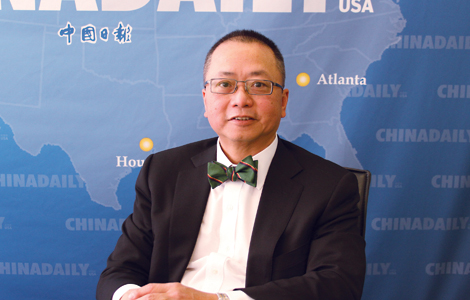
 'Global citizen' becomes head of C-100
'Global citizen' becomes head of C-100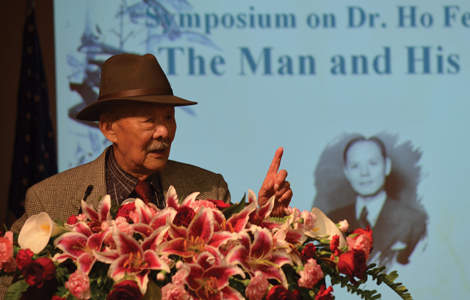
 At 96, a legendary chef can still inspire 'the best' Chinese food
At 96, a legendary chef can still inspire 'the best' Chinese food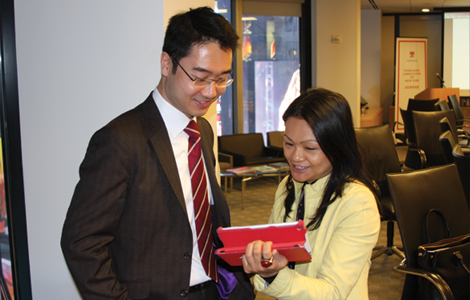
 China's wine consumption is growing
China's wine consumption is growing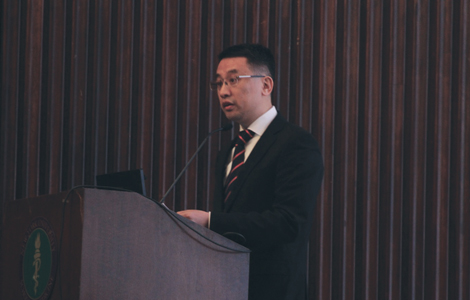
 China's reforms 'hitting right note'
China's reforms 'hitting right note'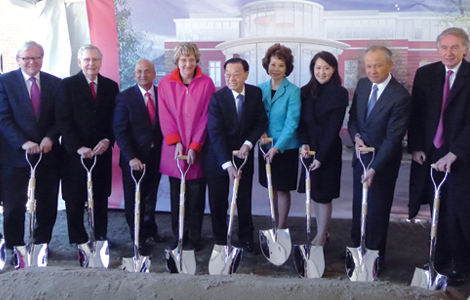
 Groundbreaking held for Harvard biz center named for a Chinese American
Groundbreaking held for Harvard biz center named for a Chinese American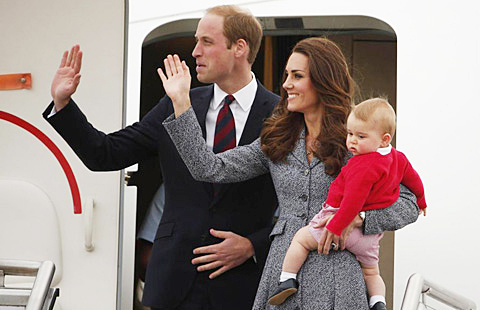
 UK royals wrap up tour of Australia and NZ
UK royals wrap up tour of Australia and NZ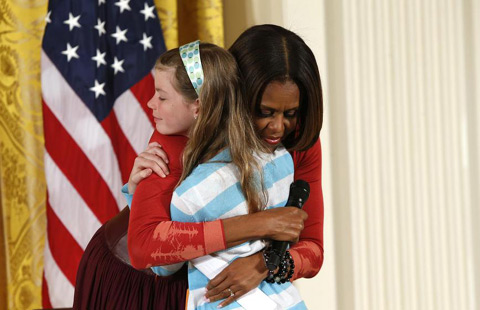
 Michelle honors 'Take our daughters and sons to work Day'
Michelle honors 'Take our daughters and sons to work Day'
 Pop-up cat cafe opens in New York
Pop-up cat cafe opens in New York
Most Viewed
Editor's Picks

|

|

|

|

|

|
Today's Top News
Obama arrives in Malaysia for 3-day visit
C-100 strengthens
US-China relations
David Tsang: Building a better future
Stephen Siu: Follow the star, no matter how far
Across America
Harvard dedicates new business center
Obama's Diaoyu Islands vow 'may backfire'
HK official says China's wine consumption can grow
US Weekly

|

|
